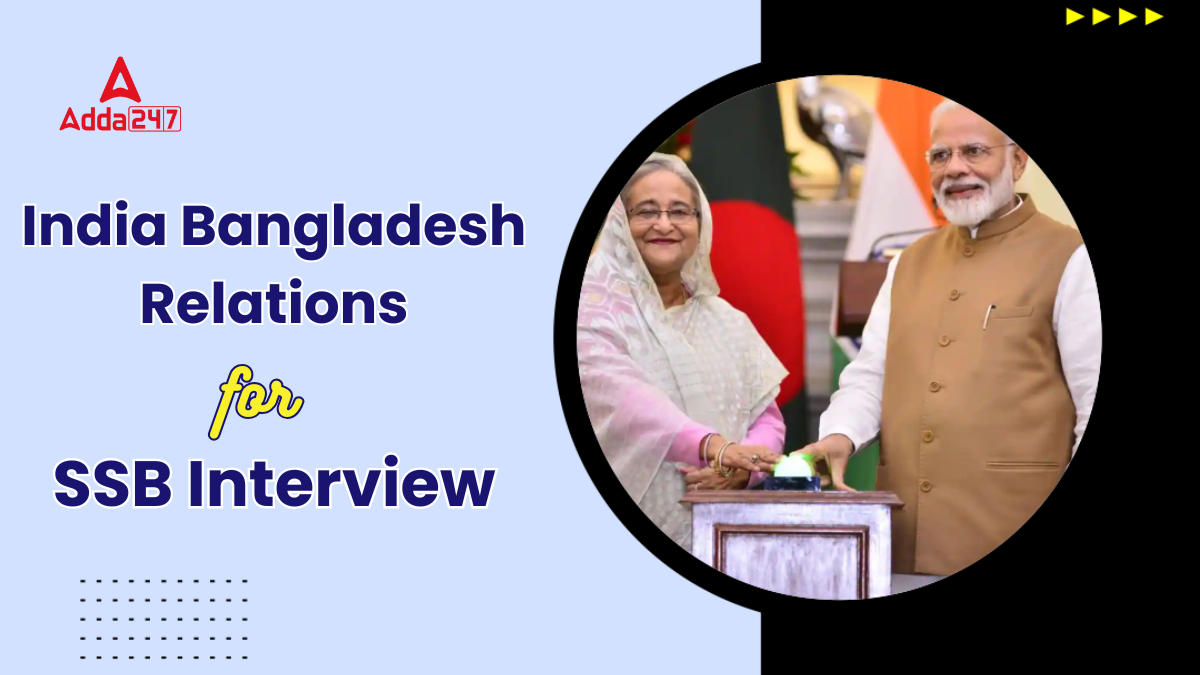India Bangladesh have a strong relationship built on shared history, language, and culture. Their close ties show a partnership based on respect, equality, trust, and mutual understanding. This relationship has become a great example of how countries can work together, not just in their region, but also for others to follow. The India-Bangladesh relationship is an essential topic for the SSB interview, so it’s vital to be prepared, as you may be asked for your opinion or encounter it on a lecturette card.
India Bangladesh Relations for SSB Interview
- Introduction
- Defence Cooperation
- India Bangladesh Disputes
- The main body which should include facts and figures
- The conclusion which should include your opinion about the topic
Introduction
The first half of 2024 has seen a significant growth in bilateral relations between Bangladesh and India, reflecting the strength and resilience of their partnership. Prime Minister Sheikh Hasina began her new term in January 2024 after a historic victory for a fourth consecutive term. However, later protests by students in Bangladesh against the quota of government jobs resulted in Hasina resigning from the post of Prime Minister. This movement gradually turned into a massive demonstration demanding her resignation, bringing an end to her long-running tenure. As such, the challenge of maintaining the stability of bilateral relations has become all the more important, while there is a need to further dialogue and cooperation between the two countries.
Defence Cooperation
In recent years, India and Bangladesh have significantly enhanced their defence cooperation through a series of high-level exchanges and joint initiatives, highlighting the importance of military collaboration between the two nations.
- Bilateral Exchanges in Defence (2023-2024): Significant visits of Chiefs of the Indian and Bangladesh Armed Forces. Indian Air Chief Marshal Vivek Ram Chaudhari visited Dhaka (26th February-1st March 2024). Visit included Bangladesh Air Force Academy (BAFA) in Jessore and National Defence College (NDC) in Mirpur.
- National Defence College Delegation: A three-member delegation from Bangladesh’s NDC, led by Lt Gen Md. Saiful Alam, visited India in May 2024.
- Chief of Army Staff Visits: Bangladesh Chief of Army Staff visited New Delhi (27-29 April 2023). Indian Army Chief visited Bangladesh in June 2023 for the Passing Out Parade at Bangladesh Military Academy.
- Annual Defence Dialogue: 5th Annual Defence Dialogue and 4th Tri-Services Talks held in Dhaka (20-21 August 2023) to review ongoing defence cooperation.
- Chief of Naval Staff Visits: Bangladesh Chief of Naval Staff visited India (12-15 September 2023).
- Muktijoddha Engagements: Scholarships distributed to heirs of Muktijoddhas in March 2022, renewed for five more years. Muktijoddha Medical Scheme implemented for medical treatment in India since 2020. Delegation of 30 Muktijoddhas and 6 serving BDAF officers attended ‘Vijay Diwas 2023’ in Kolkata. Reciprocal participation by 30 Indian War Veterans and 6 serving officers in Victory Day celebrations.
India Bangladesh Disputes
India-Bangladesh relations have always been friendly and cordial, although border disputes have cropped up on some occasions. The foundation of these relations was laid in 1971, when India played a key role in the independence of Bangladesh from East Pakistan, in which about 90,000 Pakistani soldiers became prisoners of war. Since then, India’s relations with Bangladesh have grown stronger. Indian Prime Minister Narendra Modi has played a key role in resolving the disputes that have been going on since last year by signing 22 agreements and exchanging a total of 162 areas. This cooperation is an important step towards further strengthening friendship and peace between the two countries.
In the current scenario, both countries are common members of the South Asian Association for Regional Cooperation (SAARC), Bay of Bengal Association for Regional Cooperation (BIMSTEC), and Indian Ocean Rim Association (IORA). A special reason for the closeness and cooperation between Bangladesh and India is that the north-eastern states of India, such as West Bengal, share the border with Bangladesh. This cultural connection reduces the barriers to communication between the people of the two countries. When there was a dispute in Bangladesh, the Prime Minister of that country came to India and took refuge. This is also a proof of being a good and true neighbor.
Facts and Figures
Trade Relations
The trade volume between India and Bangladesh has grown significantly, reaching $18 billion in 2023, up from $2.7 billion in 2010. India exports goods worth approximately $16 billion to Bangladesh, with key items including cotton, vehicles, and cereals. Bangladesh exports around $2 billion in products to India, primarily jute, apparel, and fish. This economic partnership has positioned Bangladesh as India’s largest trading partner in South Asia.
Border and Security
India and Bangladesh share one of the world’s longest land borders, extending 4,096 km. The Land Boundary Agreement (LBA), signed in 2015, resolved border disputes by exchanging 162 enclaves and benefitting over 50,000 people. In terms of security, both countries conduct Exercise Sampriti, a regular joint military exercise aimed at enhancing counter-terrorism cooperation and fostering mutual trust.
Energy and Infrastructure
India exports 1,160 MW of electricity to Bangladesh, helping meet its growing energy requirements. The Maitree Super Thermal Power Project further supports Bangladesh’s power infrastructure, contributing to energy security and environmental standards. The BBIN Motor Vehicles Agreement (Bangladesh, Bhutan, India, Nepal) enhances regional connectivity by facilitating the movement of goods, significantly reducing logistics costs.




 BSF HCM Admit Card 2025, Download HCM AS...
BSF HCM Admit Card 2025, Download HCM AS...
 UPSC CAPF AC Syllabus 2025 and Exam Patt...
UPSC CAPF AC Syllabus 2025 and Exam Patt...
 UPSC CAPF Previous Year Papers for Paper...
UPSC CAPF Previous Year Papers for Paper...












